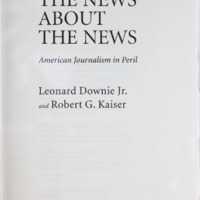-
Title
-
The news about the news : American journalism in peril
-
Description
-
Leonard Downie, Jr. and Robert G. Kaiser - both reporters and editors at the Washington Post for nearly four decades - take us inside the American news media to reveal why the journalism we watch and read is so often so bad, and to explain what can be done about it. "They demonstrate how the media's preoccupation with celebrities, entertainment, sensationalism and profits can make a mockery of news. They remind us of the value of serious journalism with inside accounts of how great stories were reported and written - a New York Times investigation of Scientology and the IRS, and a Washington Post expose of police excesses. They recount a tense debate inside their own newsroom about whether to publicize a presidential candidate's long-ago love affair."--BOOK JACKET.
-
Identifier
-
1002388
-
375408746
-
Creator
-
Downie, Leonard
-
Format
-
1st ed.
-
Contributor
-
Kaiser, Robert G
-
Source
-
Brian Lamb Booknotes Collection
-
Gift of Brian Lamb, 2011.
-
Catalog record
-
Language
-
eng
-
Date
-
2002
-
Program air date: April 7, 2002
-
Publisher
-
A.A. Knopf
-
George Mason University. Libraries. Special Collections & Archives
-
Text
-
Transcription of Annotations
Notes from front endpapers: "Sept. 11 belongs to TV - seems to be everything; Sept. 12 belonged to newspapers. - Why should TV news do what newspapers do? - Most daily newspapers are "mediocre", p. 109. - Classified - 20-40% of a newpaper's revenue - why internet for no charge? - 1964: 81% of Americans read a newspaper; 2000: 56%. - American newspapers took in $463 billion in ad[vertising] in 1999; industry has 21.5% of market, Broad. & Cable 23.3%. - What are the Post's margins? - New York Times cut hundreds of blue-collar jobs, p. 77. - Pew: travel and research money. - Most unfortunate trend is the conversion of working journalists into celebrities themselves. - Russert, p. 231: news analysis or political speech? - Declining coverage, p. 238. - Why is foreign journalism so important? - The internet has disappointed those who predicted original journalism. - All news channels have a low audience. - Post has a partnership with MSNBC. - What is good journalism? - Proliferation of news outlets, p. 11. - A bright future - why? - Money has always dominated American life but in modern times it has been democratized. - Why is there a steady decline in number of people keeping up? - p. 258: What's a great newspaper? - Television news has become a cynical business." - Notes on back endpapers: "Traditional ink on paper newspaper is at risk. - CBS - a fallen star. - Future is uncertain - trends are running in wrong direction. - John Carroll, ed. of L.A. Times: Sept. 11 worth a lot of money in the long haul, p. 248. - 17,815 magazines published in U.S. in 2000. - Fragmented market place - "new". - Daily words: NPR - 13,000 [words] ATC, 90 min.; Post: 110,000 words; Times: 105,000 [words]. - NBC and the debates; Gore refusing. -O.J.: important turning point, p. 226." -- Annotations by Brian Lamb in the margins and underlining of pertinent phrases throughout the book.
-
Subject
-
"Journalism--United States."
-
"Journalists--United States--Interviews."
-
Relation
-
Original Booknotes interview
-
Rights
-
This work may be protected by copyright laws and is provided for educational and research purposes only. Any infringing use may be subject to disciplinary action and/or civil or criminal liability as provided by law. If you believe that you are the rights-holder and object to Mason’s use of this image, please contact speccoll@gmu.edu.
 1002388.pdf
1002388.pdf